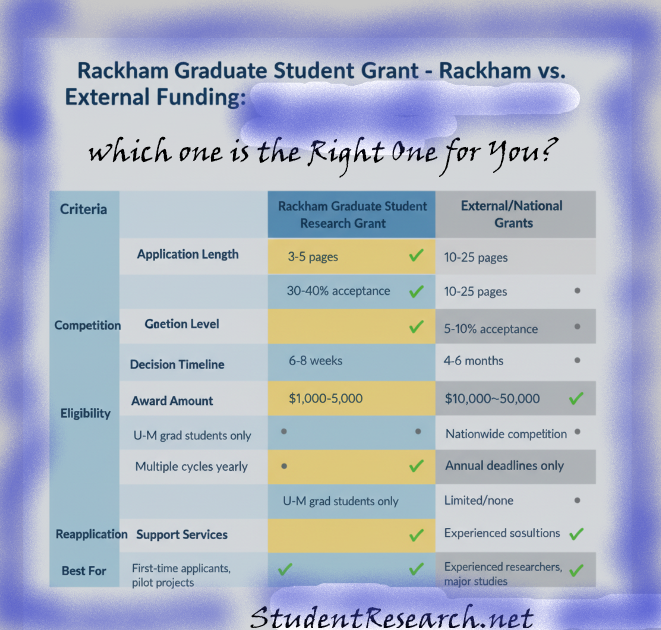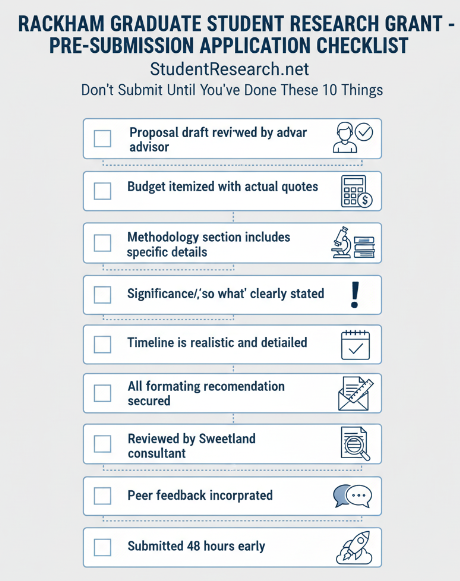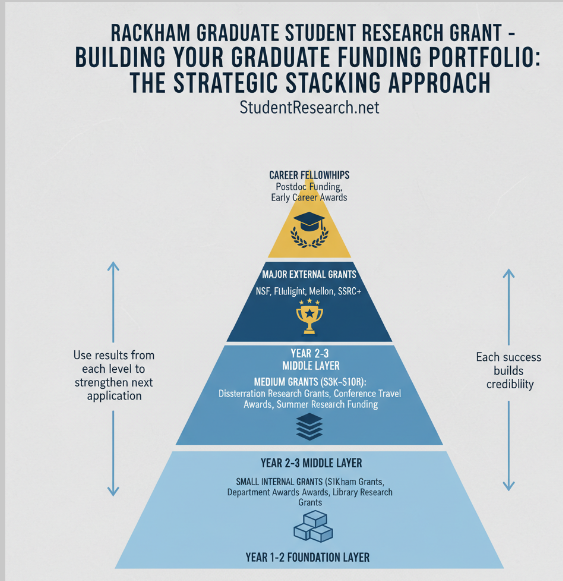Table of Contents
ToggleHow to Determine If Rackham Graduate Research Grants Are Right for Your Project
Choosing the right funding source can make or break your graduate research journey. The Rackham graduate student research grant offers substantial support for diverse scholarly projects across disciplines. Understanding what this grant covers helps you assess whether it aligns with your research needs. This section explores eligibility criteria, funding categories, and strategic advantages. Strategy I will help you assess project fit and funding alignment before applying.
What Graduate Student Research Funding Covers at Rackham
The Rackham graduate school provides comprehensive financial support tailored to graduate student research needs. Knowing what expenses qualify helps you plan your budget strategically. Here’s what the Rackham graduate student research grant typically covers:
- Types of projects eligible for Rackham graduate student research grant support: The program funds empirical research, archival work, creative projects, and interdisciplinary studies across all academic departments.
- Dissertation research grant vs. master’s thesis funding: key differences: Doctoral candidates can access larger awards ($3,000-$5,000) for dissertation work, while master’s students typically receive smaller grants ($1,000-$2,500) for thesis projects.
- What expenses qualify: Your student research budget can include fieldwork funding for site visits, data collection grants for surveys or experiments, specialized equipment purchases, software licenses, and research-related travel costs.
- Funding limits and duration for doctoral research grant programs: Most doctoral research grant awards span 12-18 months, allowing adequate time for comprehensive data collection and analysis.
- Special considerations for STEM vs. humanities graduate research support: Laboratory-based student research may require different budget justifications than library-based or ethnographic projects, though both receive equal consideration.
- Conference travel grants and presentation funding opportunities: Beyond research expenses, the Rackham graduate student research grant program includes separate funding streams for presenting your work at academic conferences.
Why Graduate Students Choose Rackham Over Other Funding Sources

Internal funding through Rackham offers distinct advantages over external grant competitions. Understanding these benefits helps you prioritize your application efforts strategically.
- Comparing Rackham graduate school grants to external academic research grants: Internal awards feature shorter application forms, faster review cycles, and higher acceptance rates than competitive national programs.
- Advantages of internal University of Michigan graduate school funding: Rackham grants require no institutional overhead costs, meaning 100% of awarded funds support your student research directly.
- How student research funding from Rackham complements graduate fellowship opportunities: You can stack Rackham grants with departmental fellowships, external scholarships, and teaching assistantships without penalty.
- Less competitive compared to national graduate research awards: While prestigious external grants accept 5-10% of applicants, Rackham graduate student research grant programs typically fund 30-40% of qualified proposals.
- Faster application-to-award timeline for graduate student stipends: Most decisions arrive within 6-8 weeks of submission, compared to 4-6 months for national competitions.
- Integration with other graduate student resources and support services: Rackham graduate student research grant recipients gain access to exclusive workshops, networking events, and mentorship programs unavailable to other students.
How to Write a Winning Rackham Graduate Student Research Grant Proposal?
A compelling proposal distinguishes successful applicants from the rest. Your application must demonstrate both scholarly merit and practical feasibility. This section provides proven strategies for crafting proposals that reviewers cannot ignore.
What Makes a Graduate Research Grant Application Stand Out
Strong applications share common characteristics that catch reviewers’ attention immediately. Understanding these elements helps you structure your Rackham graduate student research grant proposal effectively.
- Essential components of successful research proposal writing for Rackham: Your proposal needs a clear research question, robust methodology, realistic timeline, detailed budget justification, and demonstration of your project’s significance to your field.
- How to frame your dissertation research grant with clear objectives: State specific, measurable goals that reviewers can easily evaluate—avoid vague promises to “explore” or “investigate” without concrete outcomes.
- Demonstrating feasibility in doctoral research grant proposals: Show you have necessary skills, institutional access, preliminary data, or pilot results proving your student research can succeed within the proposed timeframe.
- Creating realistic budgets for fieldwork funding and data collection grants: Itemize every expense with current price quotes, explain why each item is essential, and demonstrate cost-consciousness through comparison shopping.
- Why innovation matters in academic research grants applications: The Rackham graduate student research grant review committee prioritizes projects offering fresh perspectives, novel methodologies, or interdisciplinary approaches rather than incremental studies.
- Showing alignment with Rackham graduate school priorities and values: Emphasize how your student research advances diversity, promotes collaborative scholarship, or addresses pressing societal challenges when applicable.
How Graduate Students Can Avoid Common Application Mistakes
Even strong researchers make preventable errors that doom their applications. Learning from others’ mistakes saves time and increases your success rate.
- Top reasons Rackham graduate student research grant applications get rejected: Reviewers most frequently cite unclear methodology, unrealistic timelines, inflated budgets, poor writing quality, and failure to demonstrate project significance.
- Grant application deadlines: planning backwards from submission dates: Start your Rackham graduate student research grant application at least three months before the deadline to allow time for advisor feedback, revisions, and unexpected delays.
- Budget errors that sink student research funding proposals: Common mistakes include forgetting indirect costs, underestimating student research expenses, requesting ineligible items, or failing to justify expensive equipment purchases.
- Vague methodology in graduate research support applications: Reviewers reject proposals lacking specific details about data collection methods, sample sizes, analytical approaches, or contingency plans for potential obstacles.
- Missing the “so what” factor in graduate research awards proposals: Your Rackham graduate student research grant application must explicitly state why your research matters beyond your dissertation—what gaps does it fill?
- Overlooking University of Michigan graduate school formatting requirements: Simple violations like exceeding page limits, using wrong font sizes, or missing required signatures lead to immediate disqualification.
- How to use graduate student resources for application review: Schedule appointments with Rackham writing consultants at least two weeks before submission to catch errors you’ve overlooked.

Overwhelmed with research deadlines? StudentResearch.net handles your graduate-level writing projects while you focus on coursework, internships, and life. Our expert writers deliver quality academic work fast, saving you countless hours of stress and effort.
What Resources Help Graduate Students Perfect Their Proposals
You don’t need to navigate the application process alone. The University of Michigan offers extensive support specifically designed for grant seekers.
- University of Michigan graduate school writing centers and grant consultants: The Sweetland Center offers free one-on-one consultations focused specifically on Rackham graduate student research grant proposals, helping you refine arguments and eliminate jargon.
- Workshops specifically for Rackham graduate research funding applicants: Attend quarterly workshops where successful past recipients share their Rackham graduate student research grant applications and answer questions about the review process.
- Peer review networks for graduate fellowship opportunities proposals: Join departmental writing groups or the Graduate Student Writing Exchange to receive feedback from peers familiar with your discipline.
- Sample successful master’s thesis funding and doctoral research grant applications: Rackham’s online portal provides annotated examples of winning Rackham graduate student research grant proposals across disciplines showing what excellence looks like.
- Faculty mentorship in research proposal writing: Your advisor should review at least two drafts of your Rackham graduate student research grant application, providing discipline-specific guidance on framing and methodology.
- Online tools and templates for professional development grants: Rackham provides budget calculators, timeline templates, and proposal checklists reducing formatting stress so you can focus on student research content.
What the Complete Rackham Graduate Research Grant Application Timeline Looks Like
Timing determines success as much as content does. A strategic timeline ensures you submit polished applications without last-minute panic.
How to Plan Your Graduate Student Research Grant Application (6-12 Months Before)
Early planning separates successful applicants from rushed ones. Starting well in advance gives you time to develop ideas thoroughly.
- When to start planning your Rackham graduate student research grant application: Begin conceptualizing your project 12 months before you need funding, even if the actual application takes only weeks to write.
- Early conversations with advisors about dissertation research grant ideas: Schedule monthly meetings with your advisor to refine your research questions, methodology, and ensure your Rackham graduate student research grant aligns with your dissertation trajectory.
- Preliminary research for academic research grants proposals: Conduct literature reviews, gather pilot data, or complete preliminary analyses that strengthen your proposal’s feasibility arguments.
- Building relationships with Rackham graduate school program officers: Attend office hours to ask questions about eligibility, appropriate budget categories, and what makes Rackham graduate student research grant proposals competitive in your field.
- Understanding grant application deadlines across different programs: Mark all relevant deadlines on your calendar—the Rackham graduate student research grant has multiple funding cycles throughout the academic year.
- Identifying complementary graduate fellowship opportunities: Research other internal and external funding sources that could supplement your Rackham graduate student research grant for larger projects.
What Graduate Students Need to Do in the Final Application Phase (1-3 Months Before)
The final months require intense focus and attention to detail. This is when your preparation crystallizes into a polished application.
- Finalizing research proposal writing and methodology sections: Complete your full draft at least six weeks before the deadline, allowing sufficient time for the review process of your Rackham graduate student research grant application.
- Securing letters of recommendation for doctoral research grant applications: Request letters at least one month in advance, providing recommenders with your proposal draft, CV, and specific points you’d like them to address.
- Creating detailed budgets for fieldwork funding and data collection grants: Use actual quotes from vendors, justify every line item, and ensure your budget aligns perfectly with your Rackham graduate student research grant methodology.
- Utilizing graduate student resources for last-minute reviews: Book final review appointments with Rackham consultants three weeks before submission to address any remaining weaknesses in your Rackham graduate student research grant proposal.
- Submitting student research funding applications before deadlines: Aim to submit 48 hours early to avoid technical glitches, portal crashes, or last-minute emergencies that could jeopardize your application.
- Preparing backup plans and alternative graduate research support options: Identify other funding sources you’ll pursue if your Rackham graduate student research grant application isn’t successful this cycle.
How to Handle the Post-Submission and Award Period for Rackham Graduate Grants
Understanding what happens after submission reduces anxiety and helps you plan next steps. The post-submission period requires patience and preparation.
- What happens after submitting Rackham graduate student research grant applications: Your proposal undergoes faculty committee review, typically taking 6-8 weeks, during which reviewers assess merit, feasibility, and alignment with program goals.
- Timeline for University of Michigan graduate school funding decisions: Most Rackham graduate student research grant notifications arrive via email within two months of the deadline, with funded applicants receiving detailed award letters.
- How to respond to requests for revisions in graduate research awards: Some applicants receive conditional approval requiring budget modifications or methodology clarifications—respond promptly to secure your funding.
- Accepting and managing graduate student stipends and conference travel grants: Once awarded, complete required paperwork immediately and coordinate with Rackham’s finance office to understand disbursement schedules and spending rules.
- Reporting requirements for summer research funding: Plan for mandatory progress reports and final project summaries that document how you used your funds and what you accomplished.
- Next steps if your master’s thesis funding or doctoral research grant isn’t funded: Request reviewer feedback, revise your proposal based on comments, and reapply in the next cycle—many successful recipients won funding on their second attempt.
Why Strategic Planning Maximizes Your Graduate Student Research Grant Success
Long-term thinking transforms individual applications into comprehensive funding strategies. Strategic planning ensures consistent financial support throughout your graduate career.
How Graduate Students Can Build a Multi-Year Funding Strategy

Successful graduate students view funding as a portfolio rather than isolated applications. A multi-year approach maximizes your total resources and career opportunities.
- Creating a funding portfolio beyond Rackham graduate student research grant programs: Map out all potential funding sources including departmental awards, external fellowships, teaching opportunities, and research assistantships across your entire degree timeline.
- Combining student research funding with graduate fellowship opportunities: Stack multiple smaller grants rather than relying on single large awards—this strategy provides more stable funding and impressive CV entries.
- Sequencing applications for dissertation research grant and professional development grants: Apply for preliminary research funding first, use those results to strengthen your dissertation research grant application, then pursue conference funding to disseminate findings.
- Using Rackham graduate school awards as stepping stones to external academic research grants: A successful Rackham graduate student research grant demonstrates to national funders that your research has passed rigorous internal review.
- Planning conference travel grants around research milestones: Time your conference applications to follow major project completions, maximizing your ability to present fresh findings and network strategically.
- Leveraging early graduate research support for larger projects: Use initial small grants to generate pilot data that makes you competitive for prestigious multi-year external fellowships.
What Graduate Research Awards Mean for Your Academic Career
Funding success creates momentum extending far beyond graduate school. Understanding these long-term benefits motivates strategic application efforts.
- How Rackham graduate student research grant recognition enhances your CV: Grant awards signal research competence to future employers, demonstrating you can identify important questions and secure resources to answer them.
- Converting funded doctoral research grant projects into publications: Completed funded research typically generates 2-3 peer-reviewed articles or book chapters that strengthen your publication record for job applications.
- Using graduate research awards in job applications and postdoc interviews: Highlight your funding success in cover letters and interviews as evidence of scholarly independence and project management skills valued by hiring committees.
- Building a track record with University of Michigan graduate school credentials: Each successful grant establishes credibility making you more competitive for subsequent awards at every career stage.
- Networking through graduate student resources and funded researchers: Grant programs connect you with faculty reviewers, program officers, and peer researchers who become valuable long-term professional contacts.
- Why early academic research grants success predicts future funding: Researchers who secure graduate funding are statistically more likely to win postdoctoral fellowships, early career awards, and major research grants.
- Long-term career benefits of graduate research support experience: The proposal writing, budgeting, and project management skills you develop through grant applications serve you throughout your entire academic career.
StudentResearch.net guarantees top-tier academic writing that elevates your performance. Our graduate-level specialists craft compelling research papers, theses, and dissertations designed to impress professors and boost your GPA. Superior grades are just one click away!
Conclusion
Winning your Rackham graduate student research grant requires strategic planning, meticulous preparation, and understanding what reviewers seek. This complete roadmap from application to funding success equips you with seven proven strategies covering project assessment, proposal writing, timeline management, and career planning. Master the process now by starting early, leveraging university resources, and avoiding common mistakes that derail applications. Remember that securing a Rackham graduate student research grant is more than funding—it’s a career-building achievement that demonstrates your research competence and opens doors to future opportunities. Apply these strategies systematically, seek feedback from mentors and consultants, and approach your application with confidence. Your graduate research deserves robust financial support, and Rackham provides the resources to make your scholarly ambitions reality.
StudentResearch.net offers professional academic writing services at student-friendly prices. Every project includes our money-back guarantee, ensuring risk-free excellence. Get expert graduate-level research assistance that fits your budget and exceeds expectations. Quality you can trust, affordability you’ll appreciate!